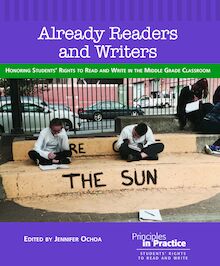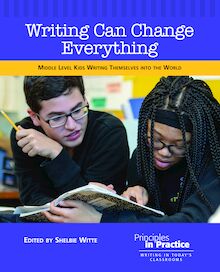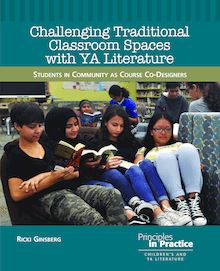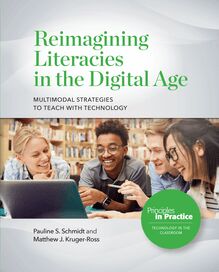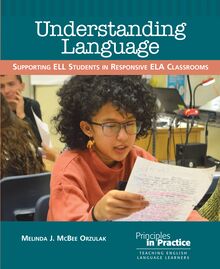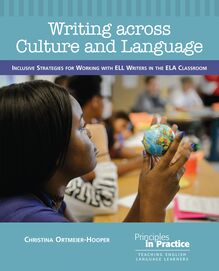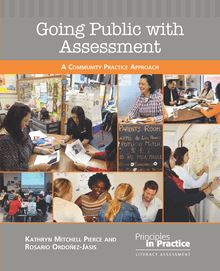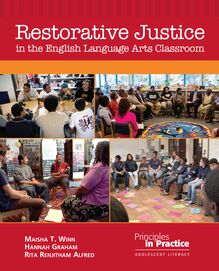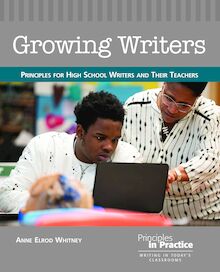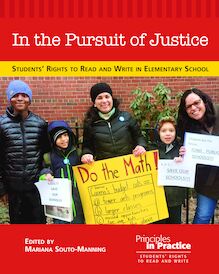-
 Univers
Univers
-
 Ebooks
Ebooks
-
 Livres audio
Livres audio
-
 Presse
Presse
-
 Podcasts
Podcasts
-
 BD
BD
-
 Documents
Documents
-
- Cours
- Révisions
- Ressources pédagogiques
- Sciences de l’éducation
- Manuels scolaires
- Langues
- Travaux de classe
- Annales de BEP
- Etudes supérieures
- Maternelle et primaire
- Fiches de lecture
- Orientation scolaire
- Méthodologie
- Corrigés de devoir
- Annales d’examens et concours
- Annales du bac
- Annales du brevet
- Rapports de stage
La lecture à portée de main
Vous pourrez modifier la taille du texte de cet ouvrage
Découvre YouScribe en t'inscrivant gratuitement
Je m'inscrisReimagining Literacies in the Digital Age: Multimodal Strategies to Teach with Technology , livre ebook
Découvre YouScribe en t'inscrivant gratuitement
Je m'inscrisEn savoir plus
Vous pourrez modifier la taille du texte de cet ouvrage
En savoir plus

Description
A reflective and practical guide for secondary school teachers on using innovative technologies in the classroom to support multimodal literacy development.
Living in a multimodal, multimedia, and multi-sensory world can be overwhelming. To prepare students to produce and consume the multimodal texts made possible through modern technologies, Schmidt and Kruger-Ross advocate for a slower and more deliberate approach to thinking and planning for teaching literacies. They showcase how technologies can expand, enhance, and inspire the consuming and producing powers of secondary students by examining visual and aural literacies before multimodal literacies.
Embedded throughout the book are the voices and materials of real practicing and preservice teachers, via QR codes. Teachers of all experience levels will find new ideas to challenge, extend, and enhance their literacy practice.
Sujets
Informations
| Publié par | National Council of Teachers of English (NCTE) |
| Date de parution | 08 novembre 2018 |
| Nombre de lectures | 0 |
| EAN13 | 9780814132036 |
| Langue | English |
| Poids de l'ouvrage | 1 Mo |
Informations légales : prix de location à la page 0,1750€. Cette information est donnée uniquement à titre indicatif conformément à la législation en vigueur.
Extrait
The Principles in Practice imprint offers teachers concrete illustrations of effective classroom practices based in NCTE research briefs and policy statements. Each book discusses the research on a specific topic, links the research to an NCTE brief or policy statement, and then demonstrates how those principles come alive in practice: by showcasing actual classroom practices that demonstrate the policies in action; by talking about research in practical, teacher-friendly language; and by offering teachers possibilities for rethinking their own practices in light of the ideas presented in the books. Books within the imprint are grouped in strands, each strand focused on a significant topic of interest.
Adolescent Literacy Strand
Adolescent Literacy at Risk? The Impact of Standards (2009) Rebecca Bowers Sipe
Adolescents and Digital Literacies: Learning Alongside Our Students (2010) Sara Kajder
Adolescent Literacy and the Teaching of Reading: Lessons for Teachers of Literature (2010) Deborah Appleman
Rethinking the “Adolescent” in Adolescent Literacy (2017) Sophia Tatiana Sarigianides, Robert Petrone, and Mark A. Lewis
Restorative Justice in the English Language Arts Classroom (2019) Maisha T. Winn, Hannah Graham, and Rita Renjitham Alfred
Writing in Today's Classrooms Strand
Writing in the Dialogical Classroom: Students and Teachers Responding to the Texts of Their Lives (2011) Bob Fecho
Becoming Writers in the Elementary Classroom: Visions and Decisions (2011) Katie Van Sluys
Writing Instruction in the Culturally Relevant Classroom (2011) Maisha T. Winn and Latrise P. Johnson
Writing Can Change Everything: Middle Level Kids Writing Themselves into the World (2020) Shelbie Witte, editor
Growing Writers: Principles for High School Writers and Their Teachers (2021) Anne Elrod Whitney
Literacy Assessment Strand
Our Better Judgment: Teacher Leadership for Writing Assessment (2012) Chris W. Gallagher and Eric D. Turley
Beyond Standardized Truth: Improving Teaching and Learning through Inquiry-Based Reading Assessment (2012) Scott Filkins
Reading Assessment: Artful Teachers, Successful Students (2013) Diane Stephens, editor
Going Public with Assessment: A Community Practice Approach (2018) Kathryn Mitchell Pierce and Rosario Ordoñez-Jasis
Literacies of the Disciplines Strand
Entering the Conversations: Practicing Literacy in the Disciplines (2014) Patricia Lambert Stock, Trace Schillinger, and Andrew Stock
Real-World Literacies: Disciplinary Teaching in the High School Classroom (2014) Heather Lattimer
Doing and Making Authentic Literacies (2014) Linda Denstaedt, Laura Jane Roop, and Stephen Best
Reading in Today's Classrooms Strand
Connected Reading: Teaching Adolescent Readers in a Digital World (2015) Kristen Hawley Turner and Troy Hicks
Digital Reading: What's Essential in Grades 3–8 (2015) William L. Bass II and Franki Sibberson
Teaching Reading with YA Literature: Complex Texts, Complex Lives (2016) Jennifer Buehler
Teaching English Language Learners Strand
Beyond “Teaching to the Test”: Rethinking Accountability and Assessment for English Language Learners (2017) Betsy Gilliland and Shannon Pella
Community Literacies en Confianza: Learning from Bilingual After-School Programs (2017) Steven Alvarez
Understanding Language: Supporting ELL Students in Responsive ELA Classrooms (2017) Melinda J. McBee Orzulak
Writing across Culture and Language: Inclusive Strategies for Working with ELL Writers in the ELA Classroom (2017) Christina Ortmeier-Hooper
Students' Rights to Read and Write Strand
Adventurous Thinking: Fostering Students' Rights to Read and Write in Secondary ELA Classrooms (2019) Mollie V. Blackburn, editor
In the Pursuit of Justice: Students' Rights to Read and Write in Elementary School (2020) Mariana Souto-Manning, editor
Already Readers and Writers: Honoring Students' Rights to Read and Write in the Middle Grade Classroom (2020) Jennifer Ochoa, editor
Children's and YA Literature Strand
Challenging Traditional Classroom Spaces with YA Literature: Students in Community as Course Co-Designers (2022) Ricki Ginsberg
Technology in the Classroom Strand
Reimiagining Literacies in the Digital Age: Multimodal Strategies to Teach with Technology (2022) Pauline S. Schmidt and Matthew J. Kruger-Ross
NCTE Editorial Board: Steven Bickmore, Catherine Compton-Lilly, Deborah Dean, Antero Garcia, Bruce McComiskey, Jennifer Ochoa, Staci M. Perryman-Clark, Anne Elrod Whitney, Colin Murcray, Chair, ex officio, Emily Kirkpatrick, ex officio
Staff Editor: Cynthia Gomez Imprint Editor: Cathy Fleischer Interior Design: Victoria Pohlmann Interior Photos: Kyle Tucker Cover Design: Pat Mayer Cover Image: iStock.com/Halfpoint
ISBN 978-0-8141-3201-2; eISBN 978-0-8141-3203-6
©2022 by the National Council of Teachers of English.
All rights reserved. No part of this publication may be reproduced or transmitted in any form or by any means, electronic or mechanical, including photocopy, or any information storage and retrieval system, without permission from the copyright holder. Printed in the United States of America.
It is the policy of NCTE in its journals and other publications to provide a forum for the open discussion of ideas concerning the content and the teaching of English and the language arts. Publicity accorded to any particular point of view does not imply endorsement by the Executive Committee, the Board of Directors, or the membership at large, except in announcements of policy, where such endorsement is clearly specified.
NCTE provides equal employment opportunity (EEO) to all staff members and applicants for employment without regard to race, color, religion, sex, national origin, age, physical, mental or perceived handicap/disability, sexual orientation including gender identity or expression, ancestry, genetic information, marital status, military status, unfavorable discharge from military service, pregnancy, citizenship status, personal appearance, matriculation or political affiliation, or any other protected status under applicable federal, state, and local laws.
Every effort has been made to provide current URLs and email addresses, but because of the rapidly changing nature of the web, some sites and addresses may no longer be accessible.
Library of Congress Control Number: 2022946264
This book is dedicated to the teachers, preservice teachers, and students who persevered through the pandemic. We see you and hope this book helps us rebuild education together.
Dear Reader,
As a former high school teacher, I remember the frustration I felt when the gap between Research (and that is how I always thought of it: Research with a capital R) and my own practice seemed too wide to ever cross. So many research studies were easy to ignore, in part because they were so distant from my practice and in part because I had no one to help me see how that research would make sense in my everyday practice.
Tat gap informs the thinking behind this book imprint. Designed for busy teachers, Principles in Practice publishes books that look carefully at NCTE's research reports and policy statements and put those policies to the test in actual classrooms. The goal: to familiarize teachers with important teaching issues, the research behind those issues, and potential resources, and—most of all—make the research and policies come alive for teacher-readers.
This book is part of a new strand, one that focuses on Technology in Today's Classrooms. Each book in the strand highlights a different aspect of this important topic and is organized in a similar way: immersing you first in the research principles surrounding technology use (as laid out in NCTE's Beliefs for Integrating Technology into the English Language Arts Classroom) and then taking you into actual classrooms, teacher discussions, and student work to see how the principles play out. Each book closes with a teacher-friendly annotated bibliography to offer you even more resources.
Good teaching is connected to strong research. We hope these books help you continue the good teaching that you're doing, think hard about ways to adapt and adjust your practice, and grow even stronger and more confident in the vital work you do with kids every day.
Best of luck,
Cathy Fleischer Imprint Editor
Contents
Preface
Acknowledgments
Beliefs for Integrating Technology into the English Language Arts Classroom
Introduction
Part I .................................Foundations
Chapter 1: On Literacies
Chapter 2: On Technology
Part II ................................Visual Literacies
Chapter 3: Focusing on Visual Literacies
Chapter 4: Consuming Visual Texts: Memes
Chapter 5: Producing Visual Texts: Infographics
Part III ..............................Aural Literacies
Chapter 6: Focusing on Aural Literacies
Chapter 7: Consuming Aural Texts: Audiobooks
Chapter 8: Producing Aural Texts: Podcasts
Part IV ..............................Multimodal Literacies
Chapter 9: Focusing on Multimodal Literacies
Chapter 10: Consuming Multimodal Texts: Augmented and Virtual Reality
Chapter 11: Producing Multimodal Texts: Digital Video
Part V ................................Final Thoughts
Chapter 12: Conclusion
Annotated Bibliography
References
Index
Authors
Contributors
Preface
Who We Are
W e want to begin our journey together by introducing ourselves and our relationship to literacy and technology. As former teachers of grades 5–12 and current teacher educators, we have thought a lot about the connections among literacy, technology, and pedagogy, and so we begin by sharing some of our thinking and clarifying our beliefs and stances so that you will understand what led us to write this book and share our ideas with you.
As authors, you will see we generally write with one voice, but you will occasionally notice that our examples focus on one of us in particular
-
 Univers
Univers
-
 Ebooks
Ebooks
-
 Livres audio
Livres audio
-
 Presse
Presse
-
 Podcasts
Podcasts
-
 BD
BD
-
 Documents
Documents
-
Jeunesse
-
Littérature
-
Ressources professionnelles
-
Santé et bien-être
-
Savoirs
-
Education
-
Loisirs et hobbies
-
Art, musique et cinéma
-
Actualité et débat de société
-
Jeunesse
-
Littérature
-
Ressources professionnelles
-
Santé et bien-être
-
Savoirs
-
Education
-
Loisirs et hobbies
-
Art, musique et cinéma
-
Actualité et débat de société
-
Actualités
-
Lifestyle
-
Presse jeunesse
-
Presse professionnelle
-
Pratique
-
Presse sportive
-
Presse internationale
-
Culture & Médias
-
Action et Aventures
-
Science-fiction et Fantasy
-
Société
-
Jeunesse
-
Littérature
-
Ressources professionnelles
-
Santé et bien-être
-
Savoirs
-
Education
-
Loisirs et hobbies
-
Art, musique et cinéma
-
Actualité et débat de société
- Cours
- Révisions
- Ressources pédagogiques
- Sciences de l’éducation
- Manuels scolaires
- Langues
- Travaux de classe
- Annales de BEP
- Etudes supérieures
- Maternelle et primaire
- Fiches de lecture
- Orientation scolaire
- Méthodologie
- Corrigés de devoir
- Annales d’examens et concours
- Annales du bac
- Annales du brevet
- Rapports de stage
